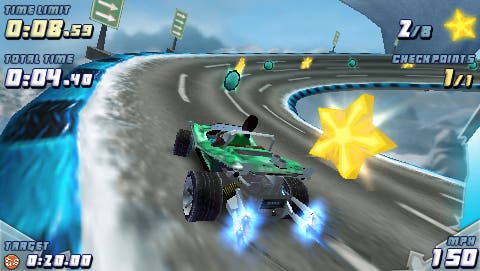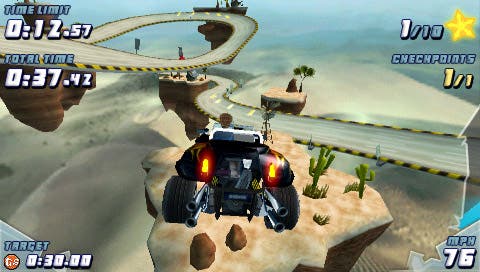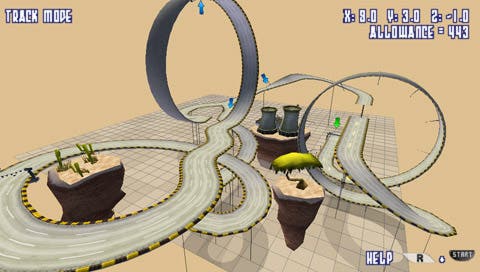Gripshift
Last go. Last-last go. Super-last go. Mega-super last go.
My little car has just fallen off the side of a road into an abyss for the sixth time in a row. The last five times, I was nearly getting it right. This time, I just plain fell off. I am cross. However I am not cross with the game. Yes, it is a game beholden to its airy, oily handling model, which revels in its lack of Newtonian logic, but it isn't random; in fact it's incredibly exact, and the many parameters that define the difference between success and failure are exactly the sorts of things that inspired admiration in games like Trackmania, Mercury and Super Monkey Ball. When I finish this paragraph, I'm going to pick the PSP up again and embark on my seventh attempt.
YYYEEEEERRRRRRRRGGGGGGHHHHHHHHHHHHH
Reviewers, particularly at this time of year when the demands of the job are severe, can find it hard to separate their own frustration - that of being unable to knock down a game's barriers quickly - from that which their readers are likely to experience. This is true of many games, of course, but games like Gripshift increase the divide, because Gripshift is built for people who delight in repetition for the sake of completion rather than mere progression. I suppose what I'm trying to say is that you should be wary of people telling you that Gripshift is frustrating because you have to do things over and over. That's the point.
It's a compulsive cycle of pausing and restarting, emulating the hooks of the abovementioned games - your objective is to drive a car from the beginning to the end of a level within a time limit, collecting a number of stars and seeking out a hidden Gripshift token as you go. Except, not necessarily as you go. The idea is to collect stars, to collect the GS token, and to shave your time until it's bald enough for a gold medal, but you can do these things separately. Reaching the end alone is enough to move on to the next level. Doing them all is a matter of pride and skill, and doing them together is a question of real skill.

Not only will you have to make judicious use of nitrous boosting on the ground, and learn to pre-empt the corners so that your arcing turns keep you on terra firma, but you will also have to direct your car's flight from ramps and bumps in the road so that you can land wherever you desire. Wherein Trackmania this was mostly a question of take-off, in Gripshift it's also about swivelling your car in mid-air and firing nitrous to change your direction, and learning when to reach for the handbrake, which also works in flight - and more acutely than it does in Trackmania. As you improve, you become more able to land facing the right way, and make best use of bounce-pads and ramps; furthermore, you start to understand the level design in terms of the seemingly lunar forces that act on your car, and realise that, for example, boost-accelerating from a moving ledge so that you hit the lip of the platform suspended ahead of you can bounce you high enough to reach the seemingly unreachable.
The next level may be a race instead - a one-on-one duel involving shield, rocket and mine power-ups, wherein holding the lead is easy but doing it and collecting all the stars is the real challenge. Platform is certainly the most prominent style, but races are enjoyable in a similar sense, and some levels are actually closer to puzzles - where reaching the goal, let alone doing so with your various stars collected, involves a bit of thought as well as skill in manipulating your unusual vehicle. Or one of the other unusual vehicles - Gripshift is home to quite a few, many of which have to be unlocked. You'll need speed, precision and ingenuity to accomplish everything.
Anyway, by now you can see why I fell off six times. The important question is, can you see why I'm going to get back on for a seventh go?
That, really, is what will decide whether you really enjoy Gripshift or simply like it. And, for those of you who think you might be in the first camp, it's worth pointing out that the initial load times aren't that bad, and the pause-restart action is near instantaneous.
That said, there are still several things that stand between Gripshift and true brilliance.

Level design is inconsistent. Many are simply good, and simply good in this context means just the right balance between punishing and rewarding, but less than exciting in terms of structure. Some, it should be noted, are outright genius. Others though - and the puzzle tracks are the best example of this - seem to miss the point. In a game where the satisfaction of eventual success is meant to justify all those occasions where you didn't quite find the right angle off a jump or the right level of braking in mid-air, levels that enforce error by asking you to experiment with teleports, some of which are a fool's errand, can seem ill conceived - although there's certainly satisfaction to be had when you manage to bypass teleports by taking to the air.
But Gripshift's worst crime is in the way it recognises your achievements. You might pick at the fact that the ratio of credits awarded to the difficulty of the task completed is jarring; you accumulate credits to open up new difficulty levels and tasks, and you only get one single extra point for hunting down that GS token or collecting all the stars, and doing them both at once doesn't improve the total (in fact, there are only a limited number of credits you can be awarded in the whole game). But actually, that's not what bothers me. That's a bit silly, but largely an academic issue for the people this sort of game is designed to satisfy. Put it this way: I sat here untangling curtain cords for 15 minutes idly searching my Saturday-morning brain for an appropriate analogy, and the act of doing so was more important than the 30 words I got out of it. It took longer than most of the other sentences on this page took, but not everything has to be a proportional response; sometimes you do things because the doing itself is why you signed up.
The real problem is that there's no impetus to complete the tasks in tandem. In questing for the tick on the level-select screen that represents completion of all the tasks on a given level, you soon realise that you can actually just pick them off one by one. It doesn't seem to punish you for splitting your endeavours into bite-sized chunks. It might sound like a semantic thing, but in games of this nature, the manner in which your achievements are acknowledged rather than simply rewarded can be crucial. In other words, I don't mind not getting that many credits, but I do think it's silly that the mark of completion is actually just a mark of attendance; it could've been more.

Moving on, there are other distractions beyond the challenge mode - a race mode with a small series of championships, passably enjoyable in isolation, and a selection of mini-games, the best of which seems to involve collecting stars strewn over a huge arena in seemingly impossible-to-reach places. Plus there's a level editor, which has the potential to breathe further life into a game that would still take many hours to conquer without it. You can also unlock different avatars and decals for your cars, although I frown so fiercely at this sort of thing that I'm probably visibly ageing every time I return to the profile page.
In the final reckoning Gripshift's probably a bit too messy to really work. It's not really an issue of the handling; it is what it is for a reason. And it's not losing points for asking me to do something - cross fingers - seven times; this is a world of acrobatic vehicular dressage, and making that perilous jump is as much about the six attempts that preceded success as it is about the success itself. No, it just doesn't seem confident enough to let itself be the thing it is, and this manifests itself in a reward structure that stops short of demanding the most of you, and in lots of tangential fodder that dilutes its purposefulness. Nonetheless, it has the feeling of a game that will appeal to people who bask in challengingly unrealistic pursuits like those of Trackmania, Super Monkey Ball and Mercury, and I reckon the PSP could do with a lot more games like it. Buy it if you know what I'm talking about.








